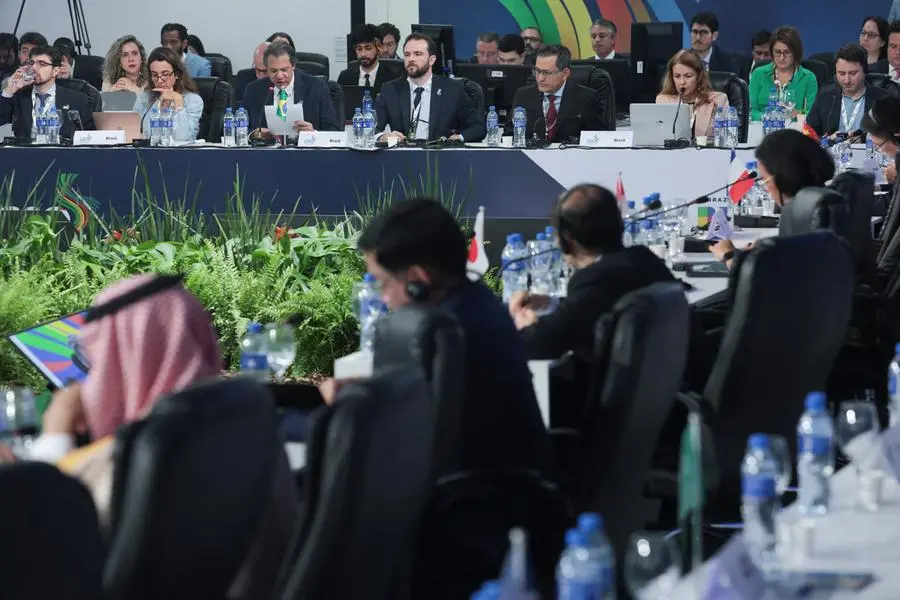PHOTO
Finance leaders from the world's largest economies failed to agree on a joint statement as they wrapped up talks on Thursday, with divisions over the wars in Gaza and Ukraine overshadowing efforts to forge a consensus on global economic development.
Brazil, which hosted finance ministers and central bank chiefs from the Group of Twenty (G20) major economies, issued its own summary in lieu of a shared communique. India took a similar tack in its G20 presidency last year, but still rallied most of the G20 in condemnation of Russia for invading Ukraine.
Brazil's summary, in line with a draft communique seen by Reuters on Tuesday, cited the economic risks of "wars and escalating conflicts" but urged debate on them in other venues. It also noted higher odds of a "soft landing" for the global economy, which would cool inflation without a major recession.
Brazilian Finance Minister Fernando Haddad told journalists that differences among G20 foreign ministers discussing regional conflicts the week before had "contaminated" talks on the financial track, spoiling efforts to reach a joint statement.
G20 officials debated late into the night and down to the final hours of the meeting how to describe the wars in a joint communique, with Russia and major Western nations at loggerheads over the language, according to people familiar with the matter.
Those geopolitical tensions ran throughout the two-day meeting, at times overshadowing the formal agenda, such as discussion of a global minimum wealth tax on the ultra-rich proposed by Brazil.
The G7 group of rich Western nations and Japan backed the idea of referring to the war "on" Ukraine, while Russia wanted to describe it as the war "in" Ukraine, said two people familiar with the matter.
The G7 countries also backed language describing the war in Gaza as a "humanitarian crisis" with no mention of Israel, the sources said.
Brazilian officials hosting the event had tried to focus talks on economic cooperation to tackle issues such as climate change and poverty, but countries including Germany pushed for a joint statement mentioning wars in Ukraine and Gaza.
Japan's vice finance minister for international affairs Masato Kanda, who attended on behalf of the finance minister, brushed aside the view the G20's credibility was on the line.
"Conflicts have a huge impact on the global economy. It affects energy and food prices, among other things. Therefore, it's obvious the impact must be discussed at the G20," he told a news conference after the G20 meeting.
INEQUALITY AGENDA
Despite the tensions hanging over the meeting in Sao Paulo, Achim Steiner, head of the United Nations Development Program (UNDP), called the start of Brazil's presidency this year a success, as the only contention of the second day of finance track talks was "over a few words" in a joint statement.
"Brazil had set clear priorities, for example, with their tax proposal," Steiner told Reuters on Thursday.
As part of efforts to address inequality, Brazil has proposed debates on a global minimum wealth tax that would ensure increased tax contributions by super-rich individuals.
"Even with slightly higher tax rates for the approximately 2,500 billionaires worldwide, very considerable additional revenue could be generated," he said.
Brazil will aim to craft a statement on international taxation by the group's July summit, Finance Minister Fernando Haddad said on Thursday. He said he was expecting a report on the matter from the European Tax Observatory, which has advocated for a global wealth tax on the world's richest people, in contrast with income taxes common in most major economies.
French Finance Minister Bruno Le Maire expressed support on Wednesday for a global minimum tax on the world's most wealthy. (Reporting by Marcela Ayres and Christian Kraemer; additional reporting and writing by Leika Kihara; editing by Brad Haynes, Gabriel Araujo, Paul Simao, Alistair Bell, Deepa Babington and Lincoln Feast)





















